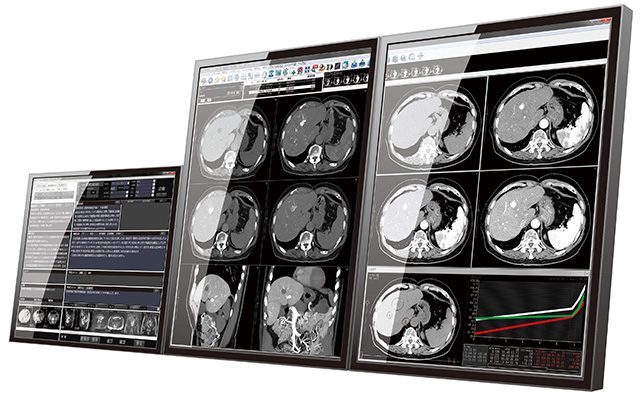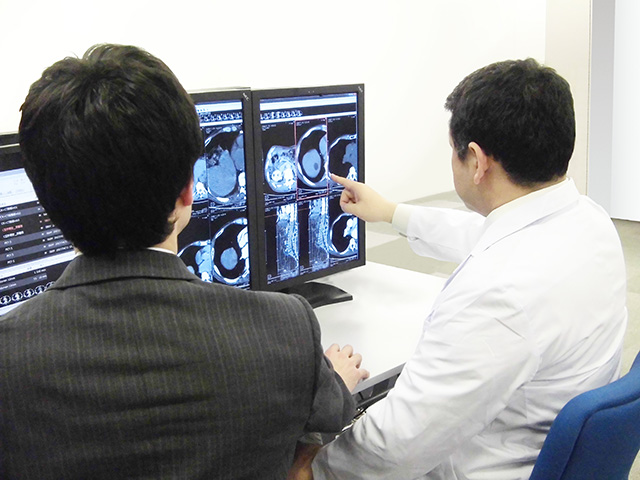Theme: Medical Data Processing Technology
Developing businesses and technologies with medical doctors and technicians in mind Applying printing-based technologies in response to demand for medical information services
Amid today’s “ultra-aging” society, DNP has undertaken to develop products and services that support consumers’ health maintenance.
We aim to synergize our P&I strengths with other technologies, including biotechnology, in order to expand our life science businesses.
Expanding businesses related to medical information systems
As one of the life science business fields that DNP is developing, medical image processing makes use of advanced information processing technologies that DNP has developed in its printing business. We have a capital and business alliance with PSP Corp., a major player in Japanese medical imaging management systems, with whom we are collaborating especially to promote a picture archiving and communication system (PACS).
PACS performs total management of all of the digital images recorded in hospitals, whether by X-ray, CT, MRI or other equipment, and makes the images available to all of the hospital’s departments. In particular, radiologists need to be able to view a large number of these types of images within a short time, in order to make timely diagnoses. A PACS supports doctors in making image-based diagnoses by providing a wide variety of image processing functions.
Using image processing technologies developed through printing to create support functions for image-based diagnosis

To date, DNP has made use of its strengths in image processing technologies to develop image processing LSIs capable of reproducing natural-looking colors that are gentle on the eyes and can correct distorted images.
In addition, we have been collaborating with Tokyo Medical and Dental University to research and develop image analysis technologies for using MRI images of eyeballs to investigate causes of pathologic myopia, which is common among Japanese people.
We plan to further develop these technologies in order to create computer-aided diagnosis (CAD) systems to support diagnosis of breast cancer and other diseases by automatically analyzing image data obtained from X-ray, CT or MRI, etc. As we progress in this development, we also intend to work to improve the accuracy of automatic analysis by adding 3D imaging, artificial intelligence, and machine learning functions.
Remote medical imaging diagnostic support services that contribute to regional medical care

In the field of community medical care, CAFI (Center for Advanced Functional Imaging in medicine) Corporation, a DNP subsidiary, that is developing a remote medical imaging diagnostic support business. The background of this business is that there is a shortage of radiologists throughout Japan, and the number of images to be checked has been growing dramatically as diagnostic imaging equipment has become faster and more advanced, thus increasing pressure for more efficient image-based diagnosis systems.
Our remote medical imaging diagnostic support business uses information technology to help relieve this pressure by transmitting images recorded in local hospitals and clinics to radiology specialists in remote locations and then returning diagnostic reports. We are handling patients’ very important and confidential information through our DNP Kashiwa Data Center, which has advanced information security functions and a highly secure network environment. Moreover, we ensure the safety of data exchanges between local medical facilities and radiologists and provide specialized environments for the reading of image data by radiologists.
Other R&D Themes